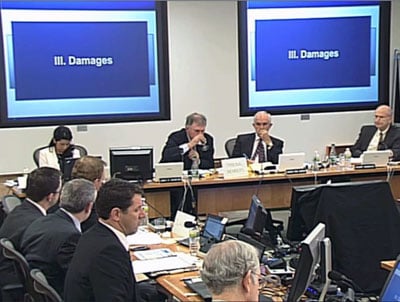Indata's Trial Director has become the dominant trial presentation specialty software, second only to PowerPoint in courtroom use. It is a powerful tool that is available to trial lawyers and to litigation consultants and represents the state of the art.
A trial lawyer has written: “Trial Director is predominantly a program used for viewing documents, photographs, videos, animations and other visual media from a computer. In my case, Trial Director made sense for two reasons: first, as a document display mechanism for trial preparation and as a reference tool; and second, during the litigation at the time of trial for "demonstrative" purposes. One of the key features of Trial Director is its ability to project documents, photographs and other media to a large monitor or screen for viewing by judge and or jury. A busy trial attorney will appreciate that preparation in advance of trial is the key to success.”
Here are the top five tips for the effective use of Trial Director from our 6 trial technicians or “hot-seat operators,” who are so called because these people who run the software are responsible for what the judge and jury see in the courtroom. One bad mistake -- and the credibility of the lawyer and case could be called into question. This is a service area where perfection is a job requirement.
- PREPARE ANNOTATIONS EARLY: When possible, make annotations in advance. In a jury trial, it is always a good idea to ask the judge in advance about this.
- DON'T LOOK TOO CANNED: On the other hand, always be prepared to do some things on the fly – to locate pieces of prior testimony or exhibits that will work well at the moment and couldn’t have been anticipated. This can help keep the jury’s attention and ensure that the case doesn’t look “canned” but is developing before the jury’s eyes.
- ADVANCE CODING IS A PLUS: Coding a database in advance with Bates and exhibit numbers can make it a breeze to find exhibits and documents when you need them.
- PREP DEPO CLIPS WELL IN ADVANCE: Create video clips in advance to remove objections and long pauses. It’s very important to respect the jurors’ time and their public service rather than bogging them down with slow-developing clips.
- TRIAL TECHS ARE TRUSTED ADVISORS: Attorneys should see trial technicians – the “hot seat” operators – as invaluable members of the team, not just as computer jocks or IT types. A seasoned trial tech has been "in the room" many times before, probably more often than most attorneys, and the trial tech’s experience should carry some weight. It doesn't hurt to ask their advice.
- 6 Tips for Effective Use of Deposition Video at Trial
- A Video Showing Trial Director's Use by A2L Trial Techs
- E-Book: 20 Things You must know before engaging a trial tech
- Check Pricing/Availability of Trial Tech/Hot Seat Operator
- A series of articles about trial technology on the A2L Consulting site







Leave a Comment